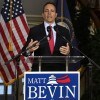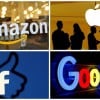Analysis | The Technology 202: Microsoft takes its fight for ‘dreamers’ in its ranks to the Supreme Court – The Washington Post

Demonstrators arrive in front of the US Supreme Court during the “Home Is Here” March for Deferred Action for Childhood Arrivals (DACA) (Photo by Jose Luis Magana / AFP) (Photo by JOSE LUIS MAGANA/AFP via Getty Images)
Ctrl + N
Microsoft is going to the Supreme Court to defend its employees who were brought to the United States undocumented as young children.
The company is among the plaintiffs in cases the Supreme Court is expected to review Tuesday that could determine the future of the Deferred Action for Childhood Arrivals (DACA) program — an Obama-era initiative that grants work permits and shields more than 660,000 qualified young immigrants who are in the U.S. illegally from deportation. More than five dozen of Microsoft’s employees are considered “dreamers” eligible for the program, and the company is challenging the Trump administration’s efforts to end it.
Microsoft President Brad Smith previewed the company’s arguments in a blog post on Friday, arguing that dreamers are an essential source of talent that Microsoft depends on. “It’s essential not just to us, but also to our country’s ability to compete on the world stage,” Smith wrote.
Smith also told stories of individual employees whose future hangs in the balance of the court’s decision. Smith wrote of a young service and security engineer at the company’s headquarters, who rose to the role after she was brought to U.S. from Mexico at the age of 4. She didn’t learn she was undocumented until she was much older, and her mother told her she would not be able to join a school field trip because she would not be able to reenter the country. Another employee working on Microsoft’s Azure product came to the U.S. with his family at four months old. After growing up close to the poverty line, he excelled at computer science while attending California Polytechnic State University and received job offers from multiple tech companies upon graduation.
Microsoft is the only corporation bringing a case in front of the Supreme Court this week — but the future of DACA has wide-ranging implications for all tech titans, who have reported that dreamers serve in many key roles at their companies. The Trump administration’s immigration policies — particularly its efforts to dismantle DACA — have emerged as one of the toughest sticking points between the White House and industry.
“For us, this fight is not just about our employees,” Smith wrote. “It’s also about the potential impact of DACA rescission on the hundreds of thousands of Dreamers, on businesses across the country, and on the innovation economy that is central to the nation’s prosperity. Roughly three-quarters of the top 25 Fortune 500 companies have confirmed that they employ Dreamers.”
Apple, which has said it employs more than 400 dreamers, earlier this year submitted a filing to the Supreme Court slamming Trump’s attempts to revoke the program. “We did not hire them out of kindness or charity. We did it because Dreamers embody Apple’s innovation strategy,” the filing said. “They come from diverse backgrounds and display a wide range of skills and experiences that equip them to tackle problems from different perspectives.”
Other technology companies including Google, IBM and Amazon have filed a brief saying that ending DACA will hurt the U.S. economy and reduce job growth. “Eliminating DACA will inflict serious harm on U.S. companies, all workers, and the American economy as a whole,” the firms wrote. “Companies will lose valued employees. Workers will lose employers and co-workers.”
The tech companies’ decision to take their concerns about DACA to the court underscore how immigration issues are emerging as a top concern for companies trying to compete for talent in a competitive environment. Smith noted in his blog post that the company is also concerned about the green-card backlog and limits on high-skilled worker visas.
“We also recognize that the Dreamers are one part of the broader immigration challenges we face as a nation,” Smith wrote. “We are committed to constructive steps to attract and retain talent that helps fuel innovation and grow our economy for the benefit of every American.”
The DACA program has been the subject of volatile yet unsuccessful negotiations between Congress and the White House. The court’s review of these cases could add pressure for lawmakers to act on the issue, though tensions would likely run high as immigration emerges as a key issue in the 2020 elections. Smith says the case before the Court “ is insufficient in addressing the permanent needs of the nation’s Dreamer population.”
“The only path to stability for Dreamers is a pathway to citizenship,” he wrote. “And citizenship in this case can only come from Congress.”
BITS, NIBBLES AND BYTES

Kentucky Gov. Matt Bevin (R). (Timothy D. Easley/AP)
BITS: A Twitter user claimed to shred a box of Republican mail-in ballots during the Kentucky gubernatorial election — fueling Republicans’ claims of voter fraud, Matthew Rosenberg and Nick Corasaniti at the New York Times report. Republican Gov. Matt Bevin is refusing to concede and his campaign is talking about “irregularities” in the vote without evidence, highlighting how similar online claims could wreak havoc during the 2020 elections.
Twitter confirmed to the Times that the now-suspended account holder, @Overlordkraken, has a history of trolling. Both the Kentucky secretary of state and federal law enforcement are investigating the tweet’s claims.
Twitter says the activity spreading the tweet appeared to be based in the United States, but the vast majority of accounts sharing the tweet were bots — enough that start-up VineSight notified the Democratic Governors Association.
While Bevin hasn’t commented on the tweet, his opponent Democratic Attorney General Andy Beshear told the Times that “it’s deeply concerning to see shady coordinated disinformation campaigns trying to undermine our democracy.”
It also has ushered in a waterfall of activity around other hashtags suggesting voter fraud that had been dormant since the 2018 elections, VineSight found. President Trump has frequently tweeted about allegations of voter fraud on his Twitter account despite providing no evidence to substantiate his claims.

Logos of Amazon, Apple, Facebook and Google. (Reuters)
NIBBLES: Numerous major tech companies fail to take full advantage of widely available tools to identify sexual imagery of children, according to an investigation by Michael H. Keller and Gabriel J.X. Dance at the New York Times. Advocates say that the companies turn a blind eye to criminals, who exploit their systems to spread abusive imagery — and that problem has gotten even worse with the growth of live-streaming and encrypted messaging.
The Times found that many cloud-storage companies have no policies for detecting child abuse content, despite the availability of technology to detect content flagged by other companies. Both Amazon and Microsoft Azure told the Times that they do not scan for child abuse imagery because of concerns about privacy. Apple also does not scan its cloud storage and encrypts its messaging, making detection virtually impossible, according to federal authorities. Dropbox, Google and Microsoft’s consumer products scan for illegal images only when the images are shared by users, not when they’re uploaded, the Times reports.
Using the image recognition technology first developed by Microsoft, the Times was also able to find abuse imagery on the company’s own search engine Bing, as well as DuckDuckGo and Yahoo, which use Bing results.
The rise of online video has exacerbated the problem; a 2017 plan by the tech industry to share digital fingerprints of footage targeting children has gone nowhere, Michael and Gabriel report. Virtually no technology exists to detect abusive imagery on live-streamed video; federal prosecutors have identified cases of child abuse being live-streamed on FaceTime, Facebook, Skype and business-conference software Zoom.

Jennifer Bailey, vice president of Apple Pay, speaks about the Apple Card. (AP Photo/Tony Avelar, File)
BYTES: New York regulators will investigate Goldman Sachs after allegations that its algorithm determining credit limits for the new Apple card discriminates against women were shared widely on Twitter, Bloomberg News’s Sridhar Natarajan and Shahien Nasiripour report. This is the second probe launched by New York regulators into algorithmic bias in recent weeks, demonstrating growing concerns with the potential discrimination caused by the technology in key industries such as financial services.
Goldman offered David Heinemeier Hansson 20 times the credit limit as his wife, who has a better credit score than he does, according to a series of tweets by Hansson. Apple co-founder Steve Wozniak said the same thing happened to him and his wife.
“Any algorithm that intentionally or not results in discriminatory treatment of women or any other protected class of people violates New York law,” a spokesman for Linda Lacewell, the superintendent of the New York Department of Financial Services, told Bloomberg.
After Hansson’s tweets went viral, Goldman bumped his wife’s credit line. Goldman denies allegations of bias against women.
“Our credit decisions are based on a customer’s creditworthiness and not on factors like gender, race, age, sexual orientation or any other basis prohibited by law,” said Goldman spokesman Andrew Williams.
PUBLIC CLOUD
— News from the public sector:
Politics
Ban political ads on Facebook? Upstart, anti-Trump candidates object.
Digital advertising, a Trump mainstay, also boosts challengers and low-budget candidates, research shows.
Isaac Stanley-Becker
Dept. of Veterans Affairs believes games can help soldiers reconnect, reduce suicides. Here’s how.
Veterans are using games to heal, with the Xbox adaptive controller providing help to those who have suffered traumatic injuries.
Alex Andrejev
Amazon spent $1.5 million on Seattle City Council races. The socialist it opposed has won.
Sawant has backed a so-called “Amazon tax” on large companies and pushed successfully to make Seattle the first big city with a $15-per-hour minimum wage.
Hannah Knowles
New Law Will Tighten Controls on Tech Exports—Once Government Sorts Out the Fine Print
The Commerce Department is facing criticism for putting off fixes to the federal export-control system, with critics saying delays could allow sensitive U.S. technology to slip through to China.
The Wall Street Journal
Tech Policy
DOJ issues new warning to big tech: Data and privacy could be competition concerns
The Justice Department’s top antitrust official warned tech giants on Friday that amassing vast quantities of consumers’ data could create competition concerns in the eyes of federal regulators, marking the U.S. government’s latest shot across the bow at Silicon Valley and its size.
Tony Romm
PRIVATE CLOUD
— News from the private sector:
Jeff Bezos asked Mike Bloomberg months ago about a presidential run
Billionaires make calls just like us.
Recode
Google and Twitter Approved Our BS Anti-Vaxx Ads
Google and Twitter allowed ads saying “Don’t get vaccinated” and “Vaccines aren’t safe.”
The Daily Beast
Building a World Where Data Privacy Exists Online
Dawn Song, an expert in computer security and trustworthy artificial intelligence, is working on making that vision a reality.
The New York Times
Instagram Will Begin Hiding Likes On Your Pictures — Here’s How People Are Reacting
“It’s gonna humble a few.”
BuzzFeed News
FAST FWD
— News about tech workforce and culture:

Laptop users. (Dado Ruvic/Reuters)
— Facebook issued an apology on Friday after an anonymous group of employees posted a blog on Medium alleging ongoing mistreatment of black, Latino and female Asian employees.
“No one at Facebook, or anywhere, should have to put up with this behavior,” Bertie Thomson, Facebook vice president of corporate communications, said in a statement to CNBC. “We are sorry. It goes against everything that we stand for as a company. We’re listening and working hard to do better.”
The employees’ letter cites numerous instances of managers soliciting negative feedback for employees of color and criticizing them for speaking up in meetings. The employees, posting under the name FB Blind, say the treatment has “gotten worse” since former employee Mark Luckie published a post in November 2018 saying the company has “a black people problem.”
“There may be a few more posters on the wall. There may be an effort to recruit diverse talent. But not much has changed to ensure that people are recognized, empowered, and overall treated equitably by their managers and peers,” they write.
#TRENDING
— Tech news generating buzz around the Web:
Why Politicians Want Your Smart-TV Data
Your Roku or Vizio device knows a whole lot about you. All that information is highly valuable for campaign advertising.
The Atlantic
An Oral History of LimeWire: The Little App That Changed the Music Industry Forever | MEL Magazine
In 2001, the internet’s premier file-sharing service Napster was shut down after just two years, leaving a giant vacuum in the ever-expanding peer-to-peer file-sharing space….
MEL Magazine
Managing Your Friendships, With Software
A slew of new start-ups want to help people manage their relationships the way they would sales leads. Should we be worried about our friends turning us into data points?
The Atlantic
CHECK-INS
— Coming up:
- The Brookings Institution will host an event on if algorithms and online biases on Tuesday at 2 p.m.
- The House Committee on Veterans Affairs will host a hearing on “Hijacking our Heroes: Exploiting Veterans through Disinformation on Social Media” on Wednesday at 2 p.m. Eastern time
- The House Judiciary Antitrust Subcommittee will host its fourth hearing on online platforms and market power, focusing on the perspectives of the anti-rust agencies, on Wednesday at 2 p.m.
WIRED IN
“We’ve made mistakes too…people make mistakes that doesn’t mean they can never be forgiven,” said Uber CEO Dara Khosrowshahi when asked about the murder of journalist Jamal Khashoggi by the Saudi Arabian government, one of the company’s biggest investors.


















